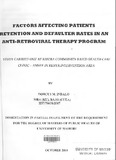Factors Affecting Patients Retention And Defaulter Rates In An Anti-retroviral Therapy Program

View/
Date
2010-10Author
Indalo, Dorcus M.
Type
ThesisLanguage
enMetadata
Show full item recordAbstract
The purpose of this research was to determine patients' retention and associated factors in the Antiretroviral Therapy (ART) program. Specifically, it establishes factors that contribute to patients' retention and recommends the appropriate strategies that enhance sustainable retention of patients in the ART program. The case studies were carried out at Kibera Community Based Health Care project/clinic - AMREF intervention area in Kibera slum
A descriptive cross-sectional method was employed aimed at collecting information from the patients in the program through random sampling, while stratified sampling was used to pick on defaulters, who were traced by Community Health Workers as well as key informants. A representative sample constituted 357 patients in the ART program, 27 defaulters and 8 Health Care Providers of the total population of patients in the program. Quantitative data was collected using a standardized questionnaire administered to the study participants in the program and defaulters. Qualitative data
was obtained through; focus Group Discussion and Key informants interviews. Ethical consideration and risk to human subjects was put into consideration, through provision of willing consent and confidentiality upheld at all times.
The study reveals that AMREF in Kenya, Kibera project continues to playa leading role in the fight against HIV/AIDS. A majority of the respondents (69%) confirmed to have disclosed their HIV status to someone while 31% were categorical that they have not disclosed their status to anyone. It is imperative to point out that disclosure levels were high (88%) amongst respondents in the 51-55 years age group and closely followed by those in the 41-45 years age group (77%). The study also found out that 49.5% of the respondents were on the affirmative that indeed they find it easy discussing their challenges with their clinicians, while 50.5% noted that they do not find it easy. It is
interesting to observe that the challenges of side effects related to ARV are more pronounced amongst those who skip appointments at the clinic compared to stigma and lack of food. A considerable number (15%) of the respondents noted that they like the clinic as it provides free ARVs while 4% lauded the good counseling services offered at the clinic. Some 3% liked the facility as it was near to their areas of residence. Asked to state the reasons why they would prefer other ART clinics, most of the respondents (63%) pointed to the distance from their areas of residence, 14% made reference to the quality of services while 8% explained that they would prefer other clinics if they offer food supplements as part of the program.
In conclusion psycho-social counseling appeared the most preferred service in the facility, it enforces adherence to medication and also reduces stigma related condition among the patients and those around them. MSF Belgium clinics were most preferred clinic in Kibera slum; AMREF Kibera project management should consider exchange visits to their sites and learn from each other. The study detects that there is a cross cutting call from the study approach that an ideal ART programme should provide comprehensive care and support (37%) and offer free medical care (15%) to enhance
accessibility besides integrating PTC (7%) among others as captured from the interviews with defaulters. Service delivery it was suggested should also be done professionally without unethical and coercive practices such sexual harassment among other malpractices that accentuate default.
AMREF Kibera project should consider to networking and collaborating with other organizations that are working in informal settlement to learn and share best practice to enhance adherence to ART care. Address the attitude of health care providers in the facility through trainings, supervision and assessment of care. The project should also review its approach to ART care and through operation research to boost ART care in marginalized communities in the informal settlements.
Citation
Degree Of Masters Of Public Health,University of Nairobi, 2010Publisher
University of Nairobi Faculty of Public Health
